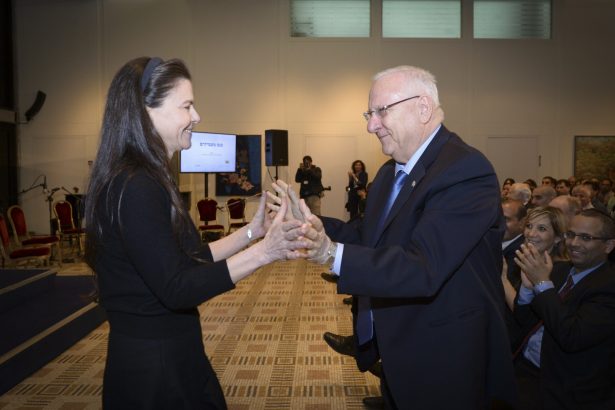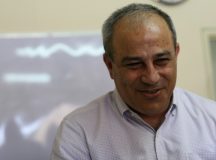Yifat Ovadia established the Collective Impact Forum (CIF) to increase the employment of the Arab population in Israel’s private sector by developing a deeper knowledge of employers’s perspectives and needs. Yifat spoke to BICOM Press Officer Judith Flacks.
Judith Flacks: What brings you to London?
Yifat Ovadia: I was invited by the UK Task Force. I am here with Aimain Saif from the Israeli government, to talk about a breakthrough in Arab employment in Israel in the private sector.
JF: Your goal is to increase the number of Arab citizens of Israel employed in the private sector. What is the situation now?
YO: According to the research we did with 50 of the largest companies in Israel, the situation today is not good. The percentage hired is about five per cent, while the Arab community constitutes more than 20 per cent of the citizens of Israel. When you check managerial positions, it is even worse – less than half a per cent. We still have hope; you have to when working for social change initiatives. A lot of the companies said they wanted to hire Arab citizens, but they do not know how to find the candidates. With the models that we have built, I think we can create a breakthrough.
JF: Why is there a gap in employment between Arabs and Jews in Israel?
YO: That is the million dollar question! Our research suggests it is complicated, so our models do not focus only on one solution or one aspect. That is why we chose the tool of ‘Collective Impact’, which is usually a tool used for challenges that cross disciplines and sectors. It is a more sophisticated model for change.
The main thing to understand is that hiring is about people. We usually look to hire the people that are like us – people we know, people we are not afraid of, we are not prejudiced against. In Israel, we live as tribes. Most Israelis do not meet Arabs, and Arabs do not meet Jews. We do not live in the same neighbourhood; we do not raise our kids at the same schools, so we do not meet each other. With the conflict and Israeli politics being what it is right now, it is hard. So it begins with fear, with not knowing, and with being prejudiced. There are also the variables of not meeting anyone, not knowing how to find the candidates. It is also about people not understanding that cultures are different, so the answers given in interviews will be different. There are all kinds of barriers, but I think it is mainly about perception.
JF: Many Israeli NGOs are working to improve employment opportunities for Arab Israelis, what are the main strategies that the Collective Impact Forum tries to use to close that gap?
YO: We partner with all players, including 30 NGOs that are working from all kinds of perspectives and using all kinds of tools to fix this situation. We are not trying to replace anyone, but to use, in a more effective way, the tools that already exist.
What is new in our approach is considering the needs and perspectives of employers; not to see employers as a supplier, but as a client. We did research with 50 companies to understand what their needs and fears are, what language we should use with them, and what kind of services we can offer them as clients.
We tell the companies: ‘You will earn more money if you stop ignoring 20 per cent of the community. We are here to help you. How can we help you? Let’s build it together’. We don not say, ‘I am coming here to help the Arab community’ (which is true, we are helping all sectors), but rather, ‘You are the client, I am here to help you, so let’s adjust the NGOs to help you in a more effective way’.
When I go to employers to change them from the inside, I say, ‘Here is the business case: you have to take responsibility, you have to have targets, numbers, measurements, as you would for any other target you have to earn more money. I will bring the NGOs that can help you and give you the services to succeed in a way that will be most effective for you.’
JF: Can you give me an example of when you have been successful, any personal stories that you would like to highlight?
YO: When we started, all partners, including the government, told us that the private sector would never give us the data on how many Arabs they employ, but they did. In fact, 46 of the largest companies in Israel gave us all of the data, opened all of their books, gave us all the answers we needed, and worked with us for a year so we could have an accurate picture of what happens today in the private sector. The second thing is that 30 of them are already willing to go through the process, take the advice that we offer, have measurements and targets, start working and taking ownership. So it has not been a full success because we cannot see the employees yet, but I think it is the beginning of a change in attitude needed in order to succeed.
JF: You work with government. Has that been a help or a hindrance for you?
YO: A complete help. Part of the Collective Impact attitude means that you do not place blame – you analyse and see how you can push each of the players to do better. I could take any one of the players and blame them. I can blame myself; I am a Jewish citizen, we are a part of the problem, we are employers and we do not employ people who are different to us. I could go to the government and blame them. I could go to the Arab community and say a lot of things to them too. Instead, we analyse and see where the barriers and opportunities are and say to the employers ‘this is what you should do in order to succeed, now what can we do?’ For example, I do not think the subsidies given by the government are effective for employers. When we partnered with the government, I said, ‘let’s ask the companies what subsidies would be more efficient for them and let’s change it together.’ We do not see the mistakes of any of the players as something to blame them for; it is about changing together, a partnership for everyone.
JF: What can people in the UK do to help?
YO: We are trying to go through a long process, and it is about perception, fear, and educating people. Any voice that supports the direction that we are going in, and any voice that is in contact with the private sector in Israel that is asking ‘are you hiring Arabs?’ and is willing to make that issue part of the dialogue, is helping to educate people and helping to make it an everyday issue for the private sector in Israel.





































Comments are closed.